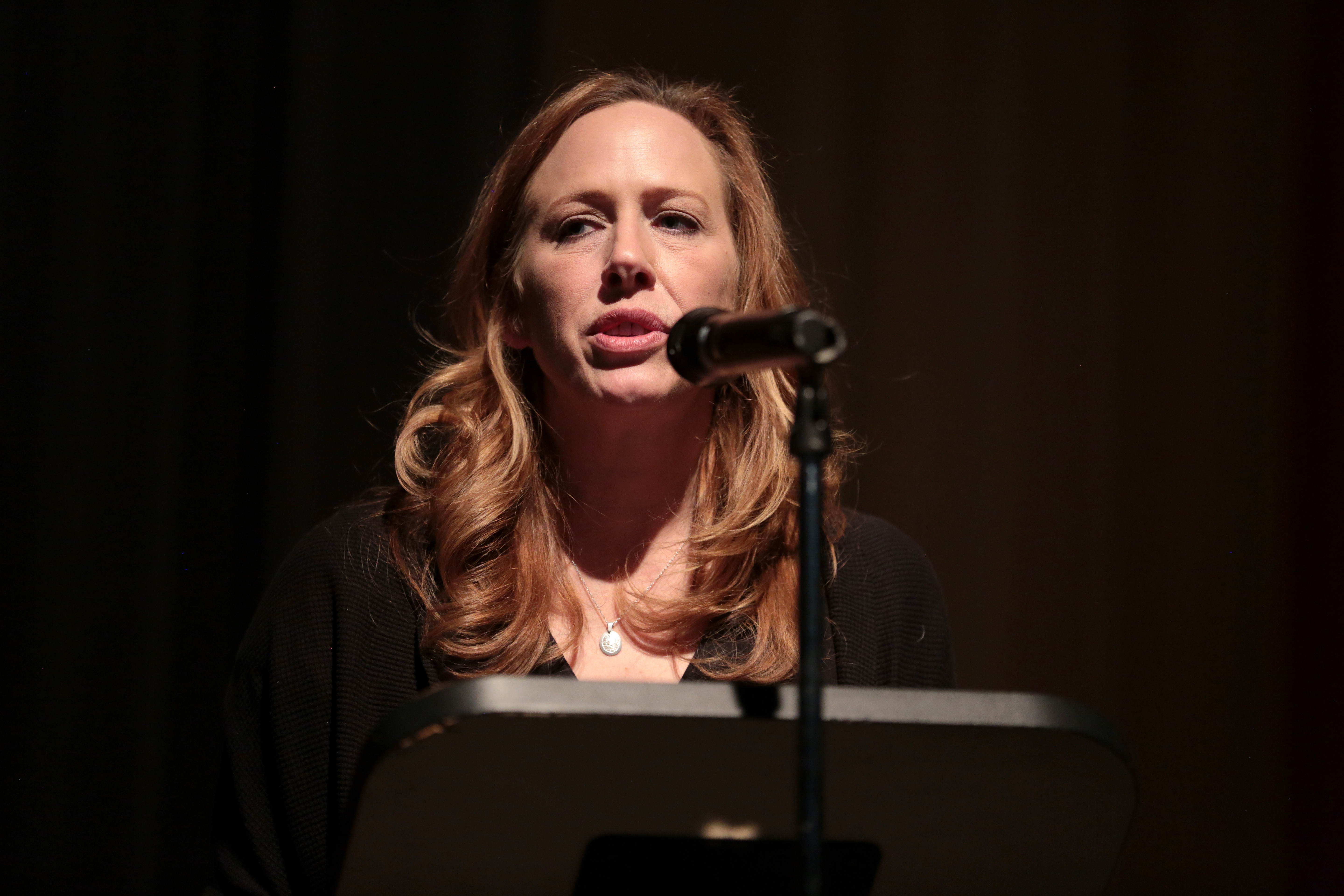
During her Nov. 5 lecture at Hillsdale College, Kimberley Strassel urged the audience to remember Benjamin Franklin’s famous words: “We have a republic, if you can keep it.” Now entering her 25th year at the Wall Street Journal, Strassel is concerned about the growing rejection of the founding principles that Franklin helped craft.
Strassel, who was the Eugene C. Pulliam Distinguished Visiting Fellow in Journalism in 2013, returned to Hillsdale for the Center for Constructive Alternatives on Socialism this week. While on campus, she spent time with Professor John Miller, Director of the Dow Journalism Program, and his journalism classes.
In her lecture, Strassel decried the rising popularity of socialism in America.
“Why are we seeing a resurgence of socialism today?” she said. “The polls show that it is mostly younger Americans who are embracing it, but it’s not enough to sit back and assume that the country’s youth will grow up. This problem is just too urgent.”
According to Strassel, America’s youth are not entirely to blame for the rise of socialism. The culprits tend to be older politicians who should know their history, but continue to push failed policies instead.
“They are the products of parenting, of education, and of political policy and culture,” Strassel said of young people. “The popularity of socialism is the result of failure by core groups of officials and civic institutions.”
Strassel argued that there are four main causes for the rise of socialism today: the Democratic Party, the Republican Party, the media, and higher education.
“I would argue that the Democrats’ motive, at least in part, is power and control,” Strassel said. “Most parties, when their message fails to resonate with the public, decide to figure out what they did wrong and to do better during the next cycle. Now, they meet political setbacks by thinking about how they can shackle the other side, or how to change the system to make it easier to win.”
However, Strassel said that the Republican Party has failed citizens as well. Although they do not propagate socialist messages like the Democrats, Republicans haven’t offered a compelling message to counter socialist arguments.
Strassel illustrated how young people see the situation.
“You can vote for Republicans and get the status quo, which no one is very happy with, or you can vote for Democrats and get free health care,” she said. “Which would you choose, given what you’ve been told by the media?”
According to Strassel, the media is damaging the country and failing young Americans.
“Increasingly, the reporters that shape the daily narrative all come from the same left-of-center communities and the same left-of-center colleges,” she said. “I grew up in a logging community in Oregon, and I don’t know a single person in journalism today who has even a remotely similar experience to mine.”
Thomas Conner, Professor of History at Hillsdale, said that the media bears most of the responsibility for the growing popularity of socialism.
“Our media is volunteering to be the mouthpiece of the Democratic Party,” he said. “The media isn’t constantly pushing socialism, but they’re definitely reporting uncritically. And we’re bombarded by the media every day.”
Like Strassel, Conner thinks that those who support socialism don’t have any idea of what it really entails.
“I think many of the youth that say they want to live under socialism don’t know what they’re talking about,” he said. “We don’t feel threatened by communism or socialism anymore. Seventy-somethings like Elizabeth Warren should know that socialism doesn’t work, but they choose to ignore the evidence.”
Strassel’s fourth culprit, higher education, also plays a significant role in pushing young people towards socialism.
“Professors tell students daily that American society is racist, sexist, ageist, corporatist, and elitist,” she said. “These kids are told that the entire world is rigged against them, and that the only remedy for such a situation is more government that will equalize society.”
Ivan Pongracic, Professor of Economics at Hillsdale, shared his unique experience with socialism during the Faculty Round Table, which took place on Nov. 6. Born and raised in Yugoslavia, he knows the realities of socialism that American politicians and universities choose to ignore.
“It was pretty nice to be in Yugoslavia during the 1970s, because we were getting massive amounts of money from the United States,” he said. “Once Marshal Tito died in 1980, the Western money dried up, and the irrationality of socialism revealed itself.”
By the time Pongracic’s family moved to America in 1984, massive shortages were already hitting Yugoslavia.
“I stood in lines for dozens of hours just to get things like coffee and milk,” he said. “The complete economic collapse led to one of the most horrific civil wars ever fought on European soil.”
Despite the creeping influence of socialism, Pongracic is hopeful that our innate American spirit will eventually reject it.
“There are so many young people that want to be entrepreneurs,” he said. “They understand that there’s something good about the free market. So go forward and fight the good fight.”

